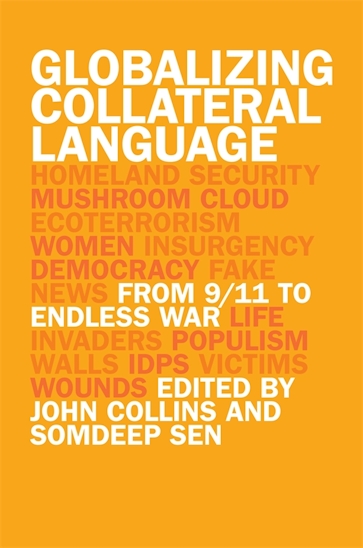Globalizing Collateral Language
From 9/11 to Endless War
Title Details
Pages: 216
Illustrations: 5 b&w images
Trim size: 6.000in x 9.000in
Formats
Hardcover
Pub Date: 09/01/2021
ISBN: 9-780-8203-6053-9
List Price: $120.95
Paperback
Pub Date: 09/01/2021
ISBN: 9-780-8203-6052-2
List Price: $28.95
eBook
Pub Date: 09/01/2021
ISBN: 9-780-8203-6051-5
List Price: $28.95
eBook
Pub Date: 09/01/2021
ISBN: 9-780-8203-6874-0
List Price: $28.95
Related Subjects
Globalizing Collateral Language
From 9/11 to Endless War
The enduring effects of our language surrounding the “War on Terror”
Skip to
- Description
- Reviews
- Contributors
Language is never just a means of communication. It terrorizes. And, especially in times of war, it has the ability to target civilians and generate fear as a means of producing specific political outcomes, most notably the passive and active acceptance of state violence itself. For this reason, the critical examination of language must be a central part of any effort to fight imperialism, militarism, demagoguery, racism, sexism, and other structures of injustice. Globalizing Collateral Language examines the discourse surrounding 9/11 and its entrenchment in global politics and culture.
To interrogate this wartime lexicon of “collateral language,” editors John Collins and Somdeep Sen have assembled a volume of critical essays that explores the long shadow of America’s “War on Terror” discourse. They illuminate how this language has now found resonance across the globe and in political projects that have little to do with the “War on Terror.” Two decades after the attacks of September 11, 2001, this book calls on us to resist the tyranny of collateral language at a time when the need for such interventions in the public sphere is more urgent than ever.
—Lori Allen, author of A History of False Hope: Investigative Commissions in Palestine
—Vernadette Vicuña Gonzalez, author of Securing Paradise: Tourism and Militarism in Hawai‘i and the Philippines
—Waleed Hazbun, coeditor of New Conflict Dynamics: Between Regional Autonomy and Intervention in the Middle East and North Africa
Pouya Alimagham
Stephen R. Barnard
Damon T. Berry
Chris Buck
George Ciccariello-Maher
Paloma Elvira
Jayantha Jayman
Ilan Kapoor
Marina Llorente
Vijay Prashad
Emanuele Saccarelli
Lotte Buch Segal
Natalia Rachel Singer
Latha Varadarajan
